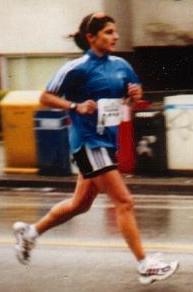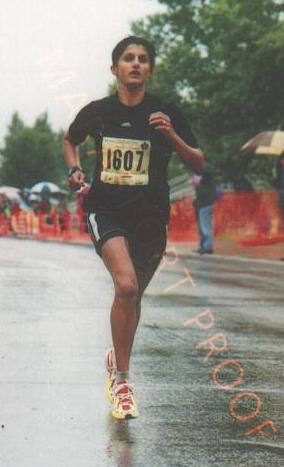Newsletter

enhancing female performance

enhancing female performance
Vol 1. Issue 3 Advance Article: Common Injuries
1. Achilles Tendonitis Once you start trying to improve for a competition or a race there is
always a danger of an injury occurring caused by
training.
Types of Injuries
There are two major injury types. They are:
acute injuries and overuse injuries.
Acute injuries occur suddenly and are the result of a
rapid increase in stress on a body system. Something happens
where a part of the body (like a muscle) is put under a
great deal of stress for a short period of time and it
suffers an injury.
Overuse injuries on the other hand are caused by a gradual breakdown
in the system you are using. Training breaks it down and not enough time
is allowed for recovery. Each time after that, it breaks
down some more. Eventually it fails. This can occur in
all of the same areas as chronic injuries. A major
cause is imbalance between the two sides of the body. One side under
more stress than the otherand eventually it
gives way.
Combinations of the two are also possible. Overuse can
create a weaker system which can be put under acute stress.
Runners should constantly be on the
look-out for any messages from their body. Common Injuries for Runners
Achilles Tendonitis Ankle Sprain Back Pain Runner's Knee Shin Splints Stress Fractures Causes of Injuries
One of the most common causes of injury is a large change in the current
activity you are doing. Any change can stress your body's systems and
should be taken with care. Some changes are: Other factors which can contribute to injury are Remember with any injury a doctor (especially specialising in
Sports) will give the best advice.
Practice doesn't make perfect, perfect practice makes
perfect.
-Fariyal Samson, B.PE, B.Ed -from an adidas poster Running Tips from around the 'net:
1. RUNNING DOWNHILL
Many runners make running downhill more difficult for themselves,
by leaning back and putting on the brakes. Use the force of gravity.
Leaning forward and increase your stride. You can pick up your pace
without increasing effort.
Leaning back into a hill takes more effort and slows your pace down.
2. WINTER IS IN THE AIR
As the weather get cooler, wearing the right amount of clothes for
running comes important. Many runners will overdress. If you feel
warm right after leaving the house, you're probably overdressed.
You should feel a little chilly at the start of your run.
3. COURTESY IN A RACE
When preparing to start in a road race, show running courtesy
by positioning yourself in the group according to your perceived
race pace. If you are a slow runner, don't move right up to
the starting line. You won't be able to keep the pace of the elite
runners and will end up getting in the road of those behind
you.
If you know that you will set a good time, there is nothing wrong
with moving up so you will have fewer runners to pass and will not
have to run at a slower pace until the pack thins out.
The Running Woman Message Board in Diet and Fitness
As of October 1st, today, a new logo is introduced for the new
'Diet and Fitness' channel. This I believe will be a better
match of two areas that go hand in hand for better health.
Good Luck and Good Running
Gord About This Newsletter
Once again a reminder that experts - we are not.
I don't get upset if someone disagrees with
something that has been said. As I have pointed out, in our own
running group here at home, it is difficult to get
agreement on most anything. If it works for you, then
it works.
You are receiving access to this newsletter because you emailed
winmotion or cl-winmotion with a running request sometime in the past.
If you do not wish to have future newletters sent to
you, please send an email to: winmotion@ivillage.com
using the word "unsubscribe" in the title.
If you have any suggestions for topics or questions
please email us. We would like to publish a monthly
newsletter that reflects the interests of the female
runner.
Gordon Samson, Editor LEGAL STUFF / SUBSCRIPTION INFO.
"Women in Motion Newsletter" is free, but its contents
are copyrighted.
October 1999
2. Ankle Sprain
3. Back Pain
4. Runners Knee
5. Shin Splints
6. Stress Fracture
The Achilles tendon on the back of the foot above the heel common
suffer damage or become inflamed.
Treatment: RICE(wait 10 mins), do not stretch until there is no pain then
gentle stretching, no hill work and maybe elevate the heel.
Prevention: orthotics, running surface, speed/hill sessions on cold
tendon.
Treatment: RICE (Rest,Ice,Compression,Elevation) followed by an ice pack
( 10 minutes on and 10 minutes off).
Prevention: shorten stride, strengthen abdominal muscles,
stretch, avoid hills and banked surfaces.
Most common injury from running mainly caused by muscle imbalance.
Treatment: RICE(Rest, Ice, Compress, Elevate) Ice for 10 minutes after running
Prevention: strengthen quadricep (muscles in front of upper leg),
flexibility of opposing muscles (hamstring, calf), arch supports.
Tenderness/pain on the front and slightly to the side of the lower leg
Treatment: RICE(wait 10 mins), no hills especially down hill, no speedwork
Prevention: strengthen muscles around shins, consider orthotics,avoid banked surfaces
This is best diagnosed by a doctor,
Usual treatment is rest, no running for 6-8 weeks.
1. Change in running surface (running on a harder surface then usual)
2. Running speed increase
3. Running on hills (downhill is especially hard)
4. Running shoes (change after 500km)
5. Running too much too soon
6. Sudden increase in distance
1. Lack of sleep
2. Poor diet
3. Unequal leg length
4. Old/not properly healed injuries
5. Poor muscle strength or muscle imbalance
6. Not enough recovery time
7. Weather conditions :extreme heat or cold
8. Poor or improper shoe fit
9. Not stretching
10. Omitting warm-up and cool down.
© Women in Motion October 1999.

"Running is like a game of chess. It's a mental
game of outwitting the part of your brain that tells
you to stop; that enough is enough; the part that
gives your ego a good kick in the rear to keep going;
and the part that tells you to push yourself beyond
one more step. Both distance and speed must be
negotiated with strategy and physical conditioning.
There is more to this than you and the competition."
Women in Motion
No one may use the content without permission of the
author and "Women in Motion".
